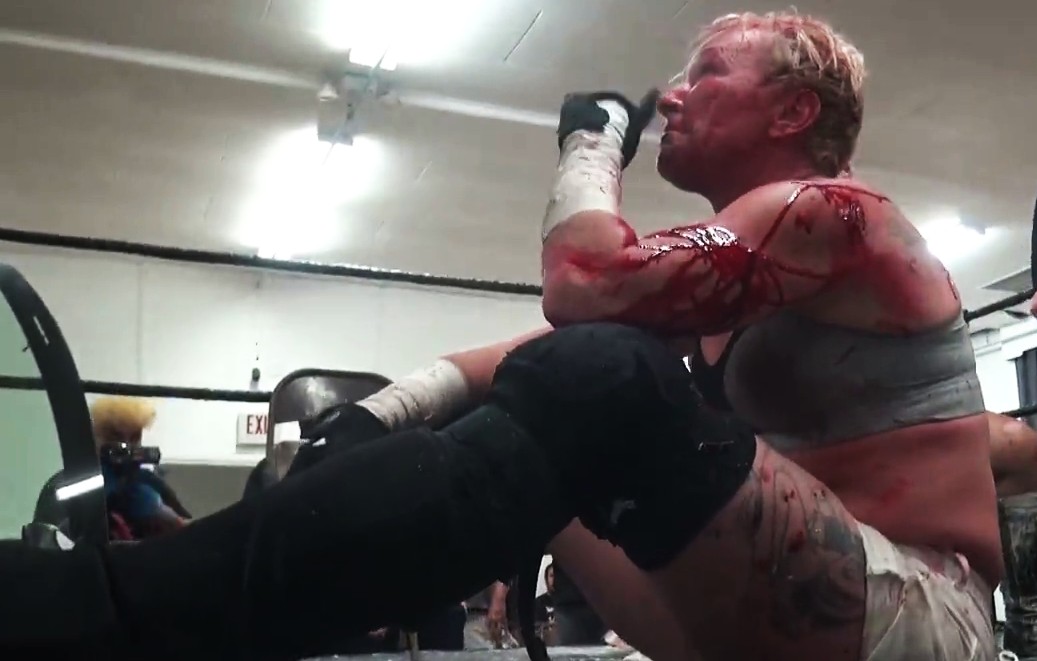Literary rating: ★★★
Kick-butt quotient: ☆☆☆½
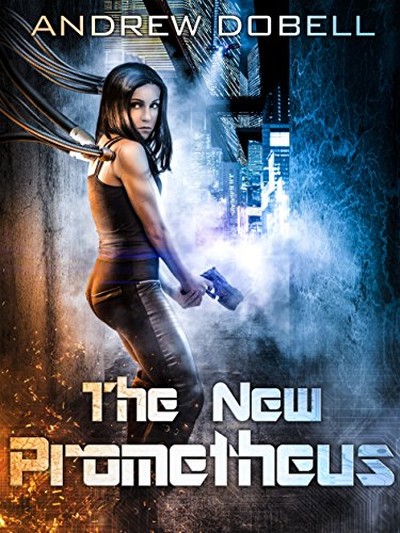 The setting is a dystopian version of London, which has become separated into two distinct halves, and classes of residents. It’s a world in which cybernetic enhancements are common. But they come at the cost of a debt – sometimes, virtual enslavement – to the powerful corporations who supply and maintain them. Frankie has resisted these, preferring to retain her humanity, and journeys into the dangerous undercity, to help those less fortunate. But on one such trip, she’s shot and left for dead. Rescued by the renegade Doctor Xenox, she wakes to find herself in a new, artificial and highly-powered body. She’s not too happy about it. Things get worse, for the doctor’s erstwhile corporate employers, Psytech, consider Frankie v2.0 as their property, and will stop at nothing to get her under control. As a result, with the help of the Doctor, and cop Gibson, she has to fend off the assembled forces of Psytech.
The setting is a dystopian version of London, which has become separated into two distinct halves, and classes of residents. It’s a world in which cybernetic enhancements are common. But they come at the cost of a debt – sometimes, virtual enslavement – to the powerful corporations who supply and maintain them. Frankie has resisted these, preferring to retain her humanity, and journeys into the dangerous undercity, to help those less fortunate. But on one such trip, she’s shot and left for dead. Rescued by the renegade Doctor Xenox, she wakes to find herself in a new, artificial and highly-powered body. She’s not too happy about it. Things get worse, for the doctor’s erstwhile corporate employers, Psytech, consider Frankie v2.0 as their property, and will stop at nothing to get her under control. As a result, with the help of the Doctor, and cop Gibson, she has to fend off the assembled forces of Psytech.
From the title and the lead character’s name, I was expecting more of a Frankenstein theme, but that appears mostly a surface patina. A bigger influence – and this is openly acknowledged in the blurb – would be the likes of Battle Angel Alita, with its young heroine seeking her own identity and self-determination, after having the “benefits” of technology imposed on her. Though the adjustment to her new form is super easy – barely an inconvenience – to the point that I’d be leaving a five-star review on Amazon for the cybernetic implants, and maybe even signing up for that extended warranty. Indeed, there’s disappointingly little internal conflict at all, and that’s where it differs from the various cyberpunk heroines cited as inspiration. Towards the end, there’s a sequence where Psytech hacks its own customers, turning them into meat puppets they can use against Frankie and her allies. Having something like this attempted against her would have helped negate the strong sense she’s over-powered. She largely breezes through her various conflicts, with little if any credible sense of threat to her.
Against this, the world building is pretty good – though, again, the separation into over- and under-class bears more than a slight resemblance to Alita. The concept of “Neo-London”, however, is a nice riff on Akira‘s post-nuclear Neo-Tokyo. I’d liked to have heard more about how it operated, and exactly how the corporations became so seemingly all-powerful. Maybe some more British flavour, too? Although, on the other hand, the ability of one young woman to stand against and defeat everything they throw at her does defuse Psytech’s omnipotence. It does escalate nicely, to a grandstand and action-packed finale after Psytech take over Gibson’s police station. and Dobell does a good job of balancing the need to wrap things up, with opening the door to further volumes. If there’s not an enormous amount new here, and little depth either (it’s not exactly Ghost in the Shell), it’s still well-enough executed to be an adequately entertaining read.
Author: Andrew Dobell
Publisher: Amazon Digital Services, available through Amazon, both as a paperback and an e-book
1 of 4 in the New Prometheus series.





 No-one does low-budget hyperviolence like the Japanese. Whether it’s pseudo-snuff like Guinea Pig: Flower of Flesh and Blood, or more fantastical entries such as
No-one does low-budget hyperviolence like the Japanese. Whether it’s pseudo-snuff like Guinea Pig: Flower of Flesh and Blood, or more fantastical entries such as 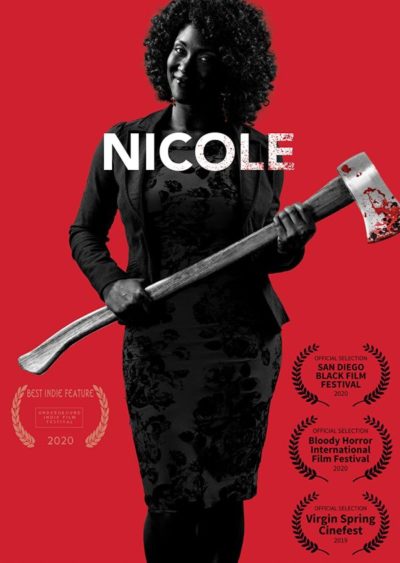 If you came into this with absolutely no previous knowledge (including the poster on the right!), you’d be forgiven if you spent the first forty minutes thinking this was an independent drama about the perils of professional dating life in the big city. Then, suddenly, it’s
If you came into this with absolutely no previous knowledge (including the poster on the right!), you’d be forgiven if you spent the first forty minutes thinking this was an independent drama about the perils of professional dating life in the big city. Then, suddenly, it’s 
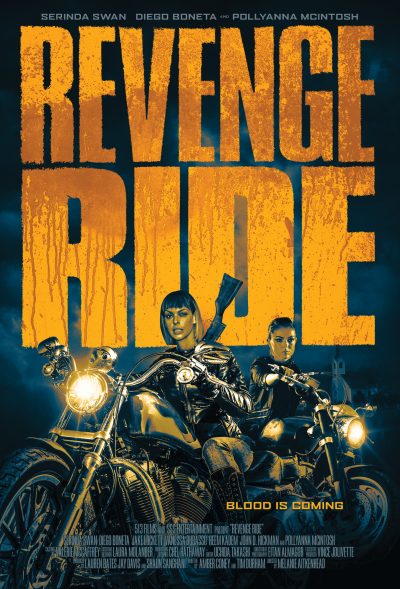 Mary (Dubasso) is drugged and raped by three members of the football team at a college party. Believing neither the college authorities nor the police will do anything, she turns to cousin Maggie (Swan) for help, because her relative is a member of the all-female Dark Moon motorcycle gang (eloquent slogan: “Eat my pussy”). Run by Trygga (McIntosh), they take revenge on the rapists, branding their catchphrase on the perpetrator’s asses, and leaving them in full view on the college campus. The fraternity boys don’t take this kindly, and strike back, causing things to escalate towards an all-out war. Complicating matters are Maggie’s increasing feelings for Brian (Boneta), one of the team, though uninvolved in the rape.
Mary (Dubasso) is drugged and raped by three members of the football team at a college party. Believing neither the college authorities nor the police will do anything, she turns to cousin Maggie (Swan) for help, because her relative is a member of the all-female Dark Moon motorcycle gang (eloquent slogan: “Eat my pussy”). Run by Trygga (McIntosh), they take revenge on the rapists, branding their catchphrase on the perpetrator’s asses, and leaving them in full view on the college campus. The fraternity boys don’t take this kindly, and strike back, causing things to escalate towards an all-out war. Complicating matters are Maggie’s increasing feelings for Brian (Boneta), one of the team, though uninvolved in the rape.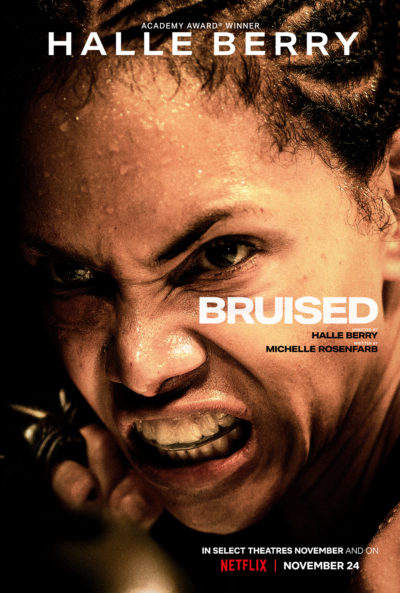 Halle Berry was born the same year I was. There is, however, just one of us that is capable of convincingly playing the role of a mixed martial artist. To give you another yardstick, the lead in this was originally going to go to Mrs. Ryan Reynolds, Blake Lively (
Halle Berry was born the same year I was. There is, however, just one of us that is capable of convincingly playing the role of a mixed martial artist. To give you another yardstick, the lead in this was originally going to go to Mrs. Ryan Reynolds, Blake Lively (
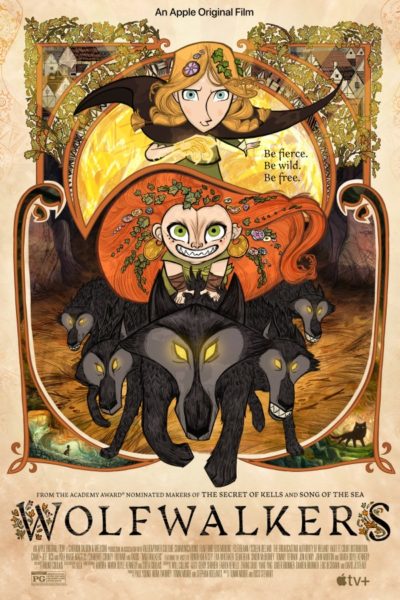
 Whenever the Olympics are on, we love watching the weird sports that never get covered the rest of the time. That means things like handball, archery and fencing, so I was particularly interested by this Russian film, based around the quest for gold in the women’s sabre event. While it does struggle to move past the usual cliches of sports films, it’s done with enough energy to work. The two protagonists are Aleksandra Pokrovskaya (Khodchenkova), a veteran coming to the end of a long, successful career, and Kira Egorova (Miloslavskaya), a brash teenager who arrives on the scene with a blast, and whose unconventional style causes fits among other fencers. Aleksandra has one final crack at the prize which has eluded her – an Olympic gold – but Kira poses an unprecedented threat to that ambition.
Whenever the Olympics are on, we love watching the weird sports that never get covered the rest of the time. That means things like handball, archery and fencing, so I was particularly interested by this Russian film, based around the quest for gold in the women’s sabre event. While it does struggle to move past the usual cliches of sports films, it’s done with enough energy to work. The two protagonists are Aleksandra Pokrovskaya (Khodchenkova), a veteran coming to the end of a long, successful career, and Kira Egorova (Miloslavskaya), a brash teenager who arrives on the scene with a blast, and whose unconventional style causes fits among other fencers. Aleksandra has one final crack at the prize which has eluded her – an Olympic gold – but Kira poses an unprecedented threat to that ambition. 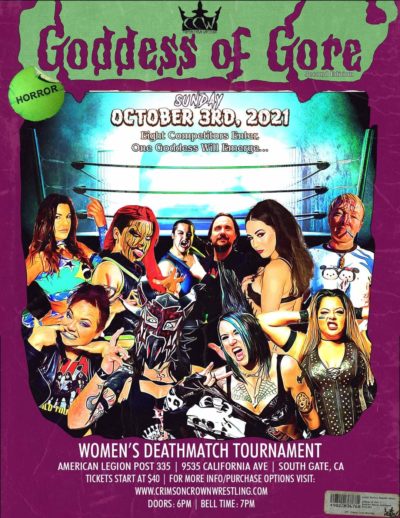 Which brings us to CCW’s Goddess of Gore 2, held at American Legion Post #335 in South Gate, California, on October 3rd, before a crowd of… dozens. Okay, that is a bit snarky. We have worked for and patronize a lot of independent federations locally, and the crowd for them is typically along similar lines, between one and two hundred. That is a bit sad, because given what the participants go through, they deserve more. Then again, tickets for this show started at forty bucks, which is easily twice the price of what we’d pay here in Arizona. Maybe, like petrol, professional wrestling just costs more in California.
Which brings us to CCW’s Goddess of Gore 2, held at American Legion Post #335 in South Gate, California, on October 3rd, before a crowd of… dozens. Okay, that is a bit snarky. We have worked for and patronize a lot of independent federations locally, and the crowd for them is typically along similar lines, between one and two hundred. That is a bit sad, because given what the participants go through, they deserve more. Then again, tickets for this show started at forty bucks, which is easily twice the price of what we’d pay here in Arizona. Maybe, like petrol, professional wrestling just costs more in California.